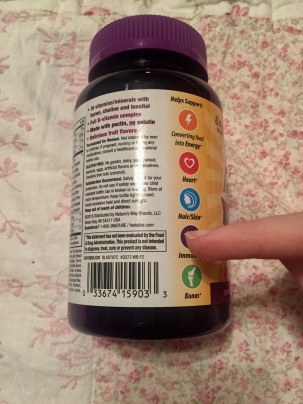By Hannah Wisterman
Blog Content Contributor
I’ll be honest: everything in my life could be falling apart, but if I remember to take my vitamins, I feel like a complete champion—a God of health who cannot be defeated by illness, fatigue, or nutritional deficiencies. It’s a small action to take to feel a little more confident in your health. But does it actually work?
It turns out that even science and medical professionals aren’t sure. Things we know: there are 13 vitamins that humans need for good health. Things we don’t know: how much we need, how much is dangerous, and the best way to get them. “Well, can’t we just take them? Isn’t that the answer?” you may ask. Not quite.
 Right on the label: “This statement has not been evaluated by the Food & Drug Administration. This product is not intended to diagnose, treat, cure, or prevent any disease.” Photo by Hannah Wisterman.
Right on the label: “This statement has not been evaluated by the Food & Drug Administration. This product is not intended to diagnose, treat, cure, or prevent any disease.” Photo by Hannah Wisterman.
First, it’s important to know that vitamins are different than dietary supplements. Like I mentioned, there are 13 essential vitamins, but there are over 85,000 dietary supplements. So not every pill or gummy you find in the health food aisle is going to be a vitamin. Additionally, vitamins and supplements sold in stores aren’t required to be tested for effectiveness—or safety. Some independent third-party companies will take it upon themselves to do that for you, but you should still be aware when you go vitamin-shopping.
“Okay,” you say, “I’ll be careful when I pick out my supplements. But I’ll still buy them; they make me healthy.” Hate to break it to you, but maybe not. According to science journalist, Catherine Price, who wrote a whole book about this stuff, multivitamins are most beneficial to those who have restricted diets or difficulty absorbing nutrients for food. If you’re already getting your greens and your veggies in, you probably don’t need to be supplementing.
In fact, if you over-supplement, you can put your health in more danger than if you were to take no vitamins at all. Vitamin A is notorious for this—too much of it can pose serious health risks like vision problems and bone pain, which is an actual, very scary-sounding thing, as well as tons of other problems. Same goes for vitamin B6, which you can almost never overdose on from food, but if overdosed on from supplements, can lead to nerve damage.
However, I don’t say this to scare you off. If you aren’t getting a lot of nutrition from your food (I’m looking at you, college kid whose Walmart cart I saw loaded with Cosmic Brownies and Bagel Bites), a multivitamin could help you out a little. But every single body is different, and has different needs. This blogger’s recommendation: take a multi if you think you need it, and supplement others very cautiously and in small amounts. Consult with your doctor, if you think you might need it. The thing to remember is that, like any medicinal item, you should only take vitamins if you need them. If you don’t, and especially if you get a little too gung-ho about it, those Flintstone gummies are going to do way more harm than good.
Featured image by Hannah Wisterman.
Share this:




![Never Dare a Dragon (Boston Dragons Book 3) by [Chase, Ashlyn]](/ai/073/224/73224.jpg)